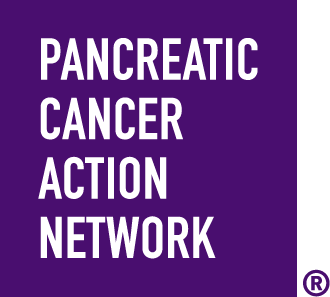X
STORIES
SURVIVOR & STRIDER STORIES
Many of us have been affected by pancreatic cancer, and it’s up to all of us to make a difference for people fighting the disease today and those diagnosed in the future. Your PurpleStride participation matters now more than ever. Keep reading for more inspiring reasons why.
Survivor Stories
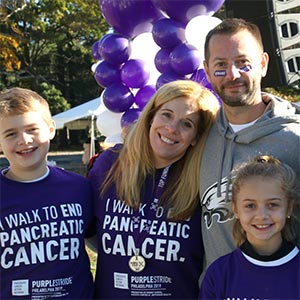
Nick Pifani
As a lifelong distance runner, I found PurpleStride after I was diagnosed with pancreatic cancer in March 2017. Initially, I was looking to run the 5K as a cancer survivor.
Read MoreMy family and friends rallied around me as I started a team for PurpleStride. I named the team "Challenge Accepted," because I accepted my diagnosis and was determined to fight and win. Joining PurpleStride also helped me learn about PanCAN and all the services they offer patients and caregivers battling this difficult disease.
It also allowed me to meet other survivors and volunteers in Philadelphia – a new purple family that we love. And lastly, it created a platform for me to get involved and advocate for myself and others.
I remember blogging during my first chemotherapy session about my battle … sharing my experience and how I was feeling.
The Philadelphia Affiliate of PanCAN volunteers discovered my blog and had a care package waiting for me during my first chemo session.
The days after my first treatment were a blur, but when I started to recover I noticed thousands of dollars were donated to my team. I understand that everyone's health and battle is different. But I believe sharing my story with my community, family, friends and coworkers opened up a level of support that was simply overwhelming.
Family and friends all over the country were following my blog, waiting for updates, leaving encouraging comments and helping anyway that they could. Sharing my story and experience has created real fundraising power for PurpleStride.
No one can tell your story like you, and I encourage others to share your stories to rally support.
PurpleStride is one of my all-time favorite events because we celebrate survivors and remember the loved ones that we have lost. It is a day full of emotions, and I always leave feeling motivated.
My favorite moment at PurpleStride was in 2017, just two weeks after my Whipple procedure, as the event's survivor speaker. I began the year as a stage III inoperable patient and ended the year cancer free.
In a world filled with many differences, an event like PurpleStride breaks down the differences and creates a strong bond for a cause.
In addition to being a three-year survivor, I have lost two cousins and an uncle to this disease. I stride for my wife (Jen), kids (Nick and Samantha), family and those who we have lost to pancreatic cancer.
I stride because a 10% survival rate is not good enough. And I stride for the family and friends we've lost, so their voices will always be heard.

G. Paris Johnson
When I was diagnosed with pancreatic cancer in 2003, I was immediately taken out of work and told I would likely never go back, and likely wouldn't live. But I refused to accept that.
Read MoreAt age 44, I had too much life left to live and too much left to offer.
At the time, I had no idea PanCAN existed, nor did I know there was a PurpleStride happening in my own community. I found out about it more than ten years later.
I was like, 'What walk? What stride?' The moment I learned about the event, I registered to participate and also raised my hand to volunteer. I was so excited to get involved.
Because of my finance background, the Philadelphia Affiliate asked me to take on the fiscal aspects for PurpleStride. It was a perfect fit for me.
Then in August 2019 my affiliate invited me to serve as the Outreach Chair, expanding PanCAN's presence in our community.
In this role, I get an opportunity to tell people how underfunded and horrible this disease is. But, more importantly, I get to serve as an example that pancreatic cancer isn't a death sentence and encourage patients and their loved ones to never give up.
At a recent gathering with my affiliate members, we were talking and getting to know one another better and it hit me. I realized then that I now have another family of supporters. It was a powerful moment recognizing the many connections volunteering has brought me.
I wish I had known about PanCAN and resources like Patient Services when I was a patient. But I'm grateful to be involved now.
Volunteering has helped me to no longer be silent. It took me over 10 years to really sit up and do something about this.
It's a blessing. Not only because of me surviving this disease, but because of the lives I now get to impact.

June Vietry
Up until March 2016, I was healthy in general. Even that month when I was diagnosed with locally advanced stage III pancreatic adenocarcinoma, I felt great. Nonetheless, the diagnosis came as a complete shock.
Read MoreAs with many cases, I was not initially a candidate for the Whipple procedure. I underwent four months of chemotherapy, followed by six weeks of daily radiation and chemo, both of which helped reduce my tumor to the point where my surgeon was willing to attempt the Whipple procedure.
Due to the complex location of my tumor, the only way to definitively know if a Whipple was possible was to try. On October 31, 2016, I underwent a successful eight-plus hour Whipple procedure, and a week later, I was given the great news that all margins were clear and all lymph nodes were negative for cancer! I started adjunct chemotherapy in January 2017 and have managed to find the good in each day.
Unfortunately, soon after I was considered "no evidence of disease," the cancer returned at my surgical site and I was now considered stage IV. Since starting chemo again in mid-2017, I have been treating consecutively with only two short chemo breaks.
In early 2019, we learned that the chemo was no longer working. I underwent more testing and procedures, and it was confirmed that the cancer had spread to my lungs and pleural lining. Along the journey, I also learned that I have numerous bone metastasis.
After a failed attempt at using a different chemo, I started a clinical trial in June 2019. The trial has me at the hospital twice per week for infusions, with markers and scans frequently to track progress. So far, the trial has kept my disease stable for nine months, and I anticipate staying this way for many more years.
My first PurpleStride walk was in May 2017 in Rhode Island. It was a beautiful sunny day, and I attended by myself to see what it was like. I was overwhelmed to see how many people were there, smiling, supporting, cheering on survivors, and remembering those we lost.
It was a sea of purple, a color I have learned to love.
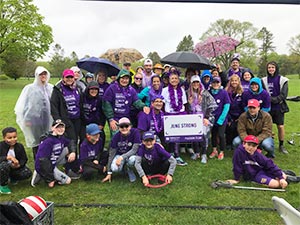 I have participated in five PurpleStride walks to date – three in Rhode Island, one in Boston, and one in Austin, Texas. My first walk was by myself, and my last walk was with a team of 33, comprised of family, friends, friends of family, friends of friends and coworkers.
I have participated in five PurpleStride walks to date – three in Rhode Island, one in Boston, and one in Austin, Texas. My first walk was by myself, and my last walk was with a team of 33, comprised of family, friends, friends of family, friends of friends and coworkers.
Each year, our team continues to grow.
As Team Captain of Team #Junestrong and a pancreatic cancer survivor, it is heartwarming to look at my team and know how many people are willing to give their time and raise money for PanCAN. Each event gives me much-needed rejuvenation and fills my emotional tank, giving me strength to continue to fight.
Many people don't realize the lack of funds and support for pancreatic cancer compared with other cancers and how PurpleStride is an essential part of fundraising.
PanCAN's PurpleStride allows patients and families to have access to endless support through Patient Central with up-to-date information on treatment options, clinical trial info and countless resources about targeted treatment and steps to take to have the best chance of beating the odds.
PurpleStride also allows money to be raised for much-needed research to better understand this disease and how to attack it.
When my journey began in 2016, my children sprang into action and through PanCAN and their resources, have been able to help me manage the crazy web that is pancreatic cancer.
In the four years that I have been battling, we have seen so many improvements in treatment, options for clinical trials, and fundraising. Four years ago, individualized treatment and Know Your Tumor® didn't exist. We had to push and figure out many things on our own that are now standard.
Without these improvements, it's unlikely I would be here today to share my story.
My advice to all other warriors is to stay educated, stay positive and never give up. Surround yourself with people who make you better, help you find the best treatment options whether standard or natural, and encourage you to live in the moment and enjoy every day!
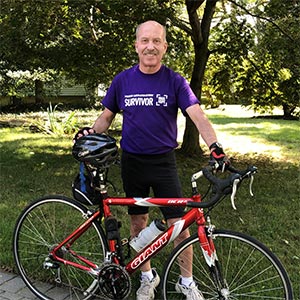
Steven Merlin
June 2012 marked a lifechanging event for me. After a short period of not feeling well, I went to see my primary care physician and within eight days, a diagnosis was made. I had a rare Pancreatic Acinar Cell Carcinoma (PACC). This exocrine adenocarcinoma is characterized as a highly aggressive tumor known for metastasis and having a poor prognosis.
Read MoreWith the bad news came some good news: It was believed the tumor was stage II and a Whipple procedure could be attempted. As preparations were underway to begin the Whipple, it was discovered that a projection from the tumor was touching the portal vein with likely vascular wall invasion.
A resection of the vein was done and after a recuperation period, chemotherapy with Gemcitabine commenced. Within five months of having the Whipple and just three months on Gemcitabine, a CT scan revealed metastatic disease in the liver. Folfirinox and genetic testing led to a clinical trial with a successful outcome.
Throughout my life, I've had a penchant for helping others. Determined not to let pancreatic cancer negatively impact this, I began to look for ways to turn a negative experience into a positive one and help others who suddenly found themselves in a similar predicament.
I became aware of the Pancreatic Cancer Action Network (PanCAN) while undergoing second-line chemotherapy. My oncologist informed me of an event dealing with scientific and clinical advances conducted by the New York City Affiliate of PanCAN. Meeting other survivors, caregivers, scientists and PanCAN staff was the catalyst that inspired me to give back by helping others.
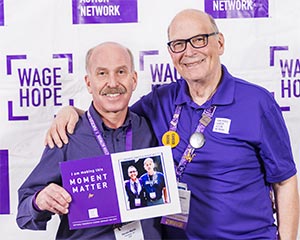 I attended my first Advocacy Day event (now PanCAN Advocacy Summit) in 2017. With other survivors and caregivers, we told our personal stories to members of Congress about how pancreatic cancer had affected our lives.
I attended my first Advocacy Day event (now PanCAN Advocacy Summit) in 2017. With other survivors and caregivers, we told our personal stories to members of Congress about how pancreatic cancer had affected our lives.
In 2018, I attended my first PurpleStride in New Jersey. Still having some neuropathy in my feet from chemo, I stayed in the Survivor Tent. I met patients and survivors, sharing my story of how I was able to remain emotionally, mentally and physically strong. Health tips and inspiring stories were shared among the attendees as well.
The next year, 2019, I attended PurpleStride events in both New Jersey and New York City, thanking participants for their selfless acts as caregivers, survivors for mentoring others, and those helping to raise money for patient and caregiver support programs provided free of charge through PanCAN's Patient Central.
When the opportunity of taking on the role of volunteer Outreach Chair for the New Jersey Affiliate was offered, I enthusiastically answered the call. The position was a natural fit.
I had a career in the life sciences and doing biomedical research. I liked explaining scientific concepts in easy-to-understand terms, so this position allowed me to conduct awareness programs for the general public.
When a PanCan volunteer I met at a support group listened to me talk about my diagnosis, treatment, and recovery, that person suggested I contact the PanCAN Survivor & Caregiver Network to serve as a mentor. I have also met newly diagnosed patients, offering support as a mentor and navigator, and put them in touch with PanCAN's Patient Central.
In 2020, I was invited to the World Pancreas Forum held in Bern, Switzerland, and was asked to deliver the Word of Welcome to 300 attendees primarily eminent surgeons as well as oncologists and scientists engaged in battling pancreatic cancer.
April will be the first of two PurpleStride walks; June will find me again at PanCAN Advocacy Summit in Washington, D.C., and as Outreach Chair, I will be busy partnering with hospitals and healthcare networks to educate the public on the importance of symptoms and early detection.
I find my new mission in life of helping others extremely rewarding and satisfying.
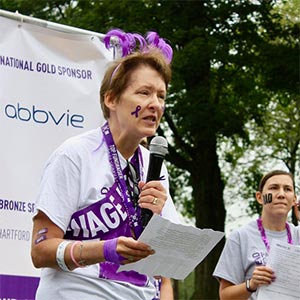
Louise Pisarski
My story began in August 2016, when I had a pain in my chest. I happened to be going to my yearly physical the following week and talked to my doctor about it.
Read MoreI have always been healthy, exercised and haven't taken any medications. My doctor was wonderful and sent me for an ultrasound the next day. From there I had a CT scan, and then a laparoscopic biopsy.
I had chemo and scheduled my surgery for the Monday after Thanksgiving and stopped working.
Surgeons removed 80% of my pancreas and my gallbladder. In January, I went back to work and continued chemo. I finished up with radiation in May 2017. My CT scans have all been clear since then.
I wanted to find some fellow survivors and found PanCAN online. That's when I discovered PurpleStride and participated in my first walk in June 2017 as a Team Captain.
My team consists of my family and some very close friends. June 2020 will be my fourth year participating in PurpleStride. I was the top team fundraiser for two years, and the top individual fundraiser for the last three years.
I enjoy giving back to PanCAN for all that I have been given. I am very blessed. I have told many of my family, friends and clients about my story, and they have been very generous when I ask for a donation.
Strider Stories

Raymond Penn
Laura and I met when we were just 13 years old. From the first day we met, we started a conversation. Every time we were together, we would just talk. I never would have guessed our conversations would keep going for the next 44 years.
Read MoreOver the years, we talked about everything our daughter and two sons, our grandchild, our love for each other and our shared passion for helping other people.
We always wanted to help and it felt good to do it and do it together.
We were at a charity walk when I noticed something was wrong with Laura's eyes – they were yellow.
The following Monday the doctor told us she had pancreatic cancer and that she'd need a Whipple procedure. We were both shocked.
The doctor told us to stay off the internet but we didn't listen. That's how we found PanCAN. I called Patient Central right away.
I told them what was going on, and they sent me a package in the mail. It had a booklet in it and a bunch of information about pancreatic cancer. They were great. I learned about PanCAN's PurpleStride walk/run events and we registered for PurpleStride Jacksonville.
Everyone was so happy there. Laura was able to get up on stage and tell everyone that she was a survivor. I was so proud of her.
That first year, Team Laura raised $2,500 – five times our fundraising goal. Our second year, we raised $3,000.
Laura did end up having the Whipple procedure, two of them actually, but neither one was successful. Her doctor put her on supportive care to keep her as comfortable as possible.
That's when our Patient Central case manager suggested some clinical trials she might be eligible for, but she had to finish up her chemo treatments first.
Laura never got the chance to start a clinical trial. And she didn't make it to the 2019 PurpleStride Jacksonville. But her spirit was definitely with all of us on Team Laura.
Before she died, Laura made me promise to continue the work we were doing together. Now I'm the Jacksonville affiliate outreach chair and also a PurpleStride team captain. Spreading awareness about pancreatic cancer is my passion.
Laura made me promise and that's what I do now. I'm living for the promise.

Lucy Karl
Serving as PurpleStride Team Captain of the Yes We Xan team has been a way for me to harness my energy to help my beloved son, Xan, fight pancreatic cancer. Xan's goal, since the day of his diagnosis in November 2014, at the tender age of 29, was to stay alive until a better treatment came along.
Read MoreWe quickly learned that the 5-year survival rate was then only 7% in 2014, and research funding was crucial to improving the survival rate.
The more I read, the more I realized, patients and their families are often too drained dealing with the disease and treatments to find the energy to drive fundraising for more research. I vowed to Xan that I would do all I could to help raise funds because I knew this was key to extending his life, and I believe it did.
It was easier to raise funds for Yes We Xan in the beginning because, family, friends and colleagues readily donated to show their support and love for Xan. In all our fundraising efforts, we educated potential donors about how PanCAN has helped our family: from the Know Your Tumor program, to the webinars to the patient support services.
We emphasized how PanCAN has made a real difference in our lives. In 2016, Xan's brother and his wife helped by asking for contributions to PanCAN in lieu of wedding presents, and hosted our own walk in Maine the morning of their wedding.
In the ensuing years, we emphasized the courage and determination Xan brought to each day, to withstand the grueling treatments, to live life fully, to not give up. We spoke of the importance of PanCAN's Know Your Tumor program and how it helped Xan and his healthcare providers decide on treatments after the cancer metastasized in 2015.
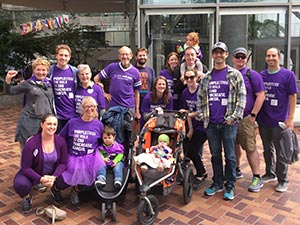 We spoke of Xan's personal successes, including the birth of his beloved son. We spoke of the reality of Xan's life ... that he did not have the luxury of quitting, and implored our family, friends and colleagues to continue to support us.
We spoke of Xan's personal successes, including the birth of his beloved son. We spoke of the reality of Xan's life ... that he did not have the luxury of quitting, and implored our family, friends and colleagues to continue to support us.
In early 2019, Xan developed brain metastases, and PanCAN has been by our side throughout the journey. In March, Xan participated in the Know Your Tumor program a second time with tissue from the brain tumor.
This was especially significant both for Xan and for researchers because less than 1% of pancreatic cancer patients develop brain metastases, and also because young adults with pancreatic cancer often do not have the KRAS or BRCA gene mutations. Learning what worked in Xan's treatment could help young adults all over the world.
When Xan had his recurrence last summer, PanCAN's Patient Services staff provided us with information and resources. In June 2019, Xan's wife participated in Advocacy Day in Washington, D.C. While there, she met a physician/researcher from MD Anderson Cancer Center who was particularly interested in Xan.
Heartbreakingly, Xan died the day before Thanksgiving, five years and 16 days after his original diagnosis. He was so proud to have reached the 5-year mark. He tried so, so, so very hard to beat this horrific disease, but in the end, the cancer proved too much.
After Xan's death, as I navigated my grief, I felt that I did not have the energy or the will to continue the We Xan team. But as the months have gone by, I realized what an insult that would be to Xan and his memory.
Xan never gave up fighting for his life. I know now that I will never give up raising funds and awareness in hopes that research will yield more treatments and better outcomes, and fewer families will have to endure what we have been through. Yes We Xan, my beloved son, Yes We Xan.

Michael Schreurs
There's a number of other terms I could use to describe myself and our pancreatic cancer journey. But these are primary, and this is the reason I'm sharing my story. Our story. To WAGE HOPE.
Read MoreIn 2013, Linda, my beautiful wife of 40+ years, began to experience acute pain in her abdomen. Over the next several months and multiple trips to the ER without finding definitive answers, we sought a more accurate diagnosis. The following spring, she was diagnosed with pancreatic cancer and was fortunate enough, as we'd learn later, to receive the Whipple surgery.
During the fall of 2014, we attended our first PurpleStride event. While there must have been nearly a thousand people in attendance, the survivors' tent told the real story – a little cadre of five people were huddled there. Surreal.
 The stats were grim in 2014 – 5% survival rate after 5 years. In the advanced scientific era we live in, how could this be? How could this be the reality of a generation raised on moonshots as its expectation?
The stats were grim in 2014 – 5% survival rate after 5 years. In the advanced scientific era we live in, how could this be? How could this be the reality of a generation raised on moonshots as its expectation?
Our journey continued, and along the way, we'd figure out how to best love, care and deal with the progression of this brutal disease. Until we weren't able to anymore.
Until just before PurpleStride 2018, the sad reality of pancreatic cancer had left us wondering what's next, what more could we have done? What more can we do now for others?
I wanted to figure out how to honor Linda with whatever my best efforts might be. PurpleStride was a start. Pancreatic Cancer Awareness Month in November allowed me to share our story in media interviews. And I began to think of how I might help in other ways to raise support and funding for next year's PurpleStride.
It meant finding my personal 'why' – why I am doing this.
Initially I thought, I don't particularly like raising money, but I love sharing our story. I gathered my list of people I knew, thought of those who may have experienced loss themselves, prepared my introductions and 'asks' and then said to myself, "This is for my bride!"
 I prepared myself for personal rejections, but I hadn't prepared for others telling me how they'd love to be a part of this cause. I saw people I knew and those I didn't literally open up to me in ways I'd never expected.
I prepared myself for personal rejections, but I hadn't prepared for others telling me how they'd love to be a part of this cause. I saw people I knew and those I didn't literally open up to me in ways I'd never expected.
Some continue to leave me nearly speechless with their impact on my life. Good people were waiting to be asked to say, "Yes, certainly. I'd like to help."
At last year's Advocacy Day, my daughter Claire and I joined an Iowa delegation in Washington, D.C. We told our story to Congresspersons as members of one of the most powerful advocacy groups I've ever been involved in. Emotionally, it was so embracing. Our voices were heard. Hope was nearly palpable.
Recently, the 5-year survival rates for pancreatic cancer increased to 10%. Still incredibly meager. But I believe our cause will begin to see forthcoming great results – a doubling, doubling again, and then, momentum until this disease is successfully dealt with ... and surviving is ... our promise.

John Edwards
Like many others, my involvement with PanCAN began with the loss of a loved one. My brother, Jim, just three days after his 60th birthday and only 27 days after his diagnosis, passed away from pancreatic cancer on February 12, 2015.
Read MoreTo say Jim and I were close probably doesn't do our relationship justice. Jim and I had either lived under the same roof or within three blocks of each other for nearly our entire lives. My wife, Julie, and Jim's wife, Lisa, were even best friends before we met them.
During Jim's last few days, there were a couple of thoughts that I could not shake. One was the thought I had failed my brother by letting the hopelessness of his diagnosis overcome me to the point I hadn't sought out more information on possible treatments or care. The second thought was that Jim's passing would not be the last time my family heard from pancreatic cancer.
After Jim passed, I promised myself that if pancreatic cancer ever did make another unwelcomed appearance in our family that it wouldn't be because I hadn't tried to make a difference. I began to search on the Internet for somewhere to focus my efforts and as soon as I saw the WAGE HOPE logo on the PanCAN website, I knew that I had found the place for me.

Along with Jim's wife and kids, Jimmy and Sarah, we decided to first get involved by forming a PurpleStride team for the 2015 event in Washington, D.C. We used Jim's nickname to create Team Big Jim.
That first year, we held only one fundraiser but were fortunate to raise over $5,300 through the generosity of Jim's family, friends and coworkers. Since the first year, we have held numerous fundraisers including a wine tasting, jewelry sale, Super Bowl squares pool and Kentucky Derby contests. We have even sponsored a TeamBigJim.com horse race at Charles Town race track for the past four years to raise money and awareness.
After the PurpleStride walk each year, we host a pool party at my home for all Team Big Jim members and donors where we serve crabs, burgers and chicken.
In the 5 years that Team Big Jim has taken part in PurpleStride Washington, D.C., we have raised over $61,000. I have always set our goal to raise $1 more than the prior year but this year I have set our sights a bit higher.
 Our goal for 2020 is to raise $20,000 and for the first time reach the Elite team level. My second goal for this year is to take part in Advocacy Day for the first time.
Our goal for 2020 is to raise $20,000 and for the first time reach the Elite team level. My second goal for this year is to take part in Advocacy Day for the first time.
Unfortunately, our efforts thus far have not kept pancreatic cancer from entering our lives again. In the years since Jim's passing, we have lost an uncle, a couple of friends, and just this past July, my daughter-in-law lost her father to pancreatic cancer.
He passed away just 10 days after his love for his daughter gave him the strength to walk her down the aisle to marry my son. My wife and I honored his battle against the disease by joining Team Babak in their walk at PurpleStride Maryland.
The recurrence of the disease in our family's lives has not broken our will to fight. Instead, we take solace in knowing that the progress PanCAN is making in awareness, research and treatment has helped those we love and everyone impacted by the disease.
JOIN US AT PURPLESTRIDE!
2024 Pancreatic Cancer Action Network. All rights reserved. Terms of Use | Privacy Policy
Pancreatic Cancer Action Network, PanCAN, PurpleStride and Wage Hope are the trademarks of Pancreatic Cancer Action Network, Inc.
The Pancreatic Cancer Action Network is registered as a 501(c)(3) nonprofit organization. Contributions to the Pancreatic Cancer Action Network are tax-deductible to the extent permitted by law. The Pancreatic Cancer Action Network’s tax identification number is #33-0841281.
